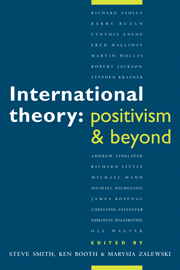Book contents
- Frontmatter
- Contents
- List of contributors
- Preface and acknowledgements
- Introduction
- I Debates
- II Legacies
- III Silences
- IV Openings
- V Directions
- 14 The last post?
- 15 Probing puzzles persistently: a desirable but improbable future for IR theory
- 16 The future of international relations: fears and hopes
- 17 75 years on: rewriting the subject's past – reinventing its future
- 18 ‘All these theories yet the bodies keep piling up’: theories, theorists, theorising
- Index
17 - 75 years on: rewriting the subject's past – reinventing its future
Published online by Cambridge University Press: 09 March 2010
- Frontmatter
- Contents
- List of contributors
- Preface and acknowledgements
- Introduction
- I Debates
- II Legacies
- III Silences
- IV Openings
- V Directions
- 14 The last post?
- 15 Probing puzzles persistently: a desirable but improbable future for IR theory
- 16 The future of international relations: fears and hopes
- 17 75 years on: rewriting the subject's past – reinventing its future
- 18 ‘All these theories yet the bodies keep piling up’: theories, theorists, theorising
- Index
Summary
For much of the 75 years of its existence the Department of International Politics at the University of Wales, Aberystwyth, has both flourished and laboured under powerful foundational myths. In this regard it can be seen as an icon (albeit often a dusty one, ignored in the corner) for most of the subject in most other places. I mean ‘myths’ here in the weak sense of the term: not as absolute fairy-tales but as part fictions/part truths – let them be called half-truths – which help shape attitudes and buttress ideologies. To be myth a story has to be recurring, primordial, and appealing to a particular group's ideals, hopes and fears, and widely felt emotions. In this way, myths, as Robert Cox said about theories ‘are for someone and for some purpose’ (1986, p. 207). Myths are not easily ignored, and on the whole I believe that they tend to sustain primitive rather than complex understandings of human predicaments. This has been the case widi our subject's foundational myths. They have helped discipline the discipline.
There are three separate elements in the foundational myths under which this Department has flourished and laboured. They focus on two individuals, whose differing opinions and acrimonious relationship became stereotyped and dramatised into a powerful story that gave meaning, a sense of direction and succour to the work of most students of international relations during the scary yet heady years of the Cold War. The individuals were David Davies and E. H. Carr.
The first element in the story is obviously made up of David Davies, the industrialist/landowner/Welshman-believing-in-education/and Liberal Member of Parliament, who endowed the Woodrow Wilson Chair in 1919.
- Type
- Chapter
- Information
- International TheoryPositivism and Beyond, pp. 328 - 339Publisher: Cambridge University PressPrint publication year: 1996
- 11
- Cited by

